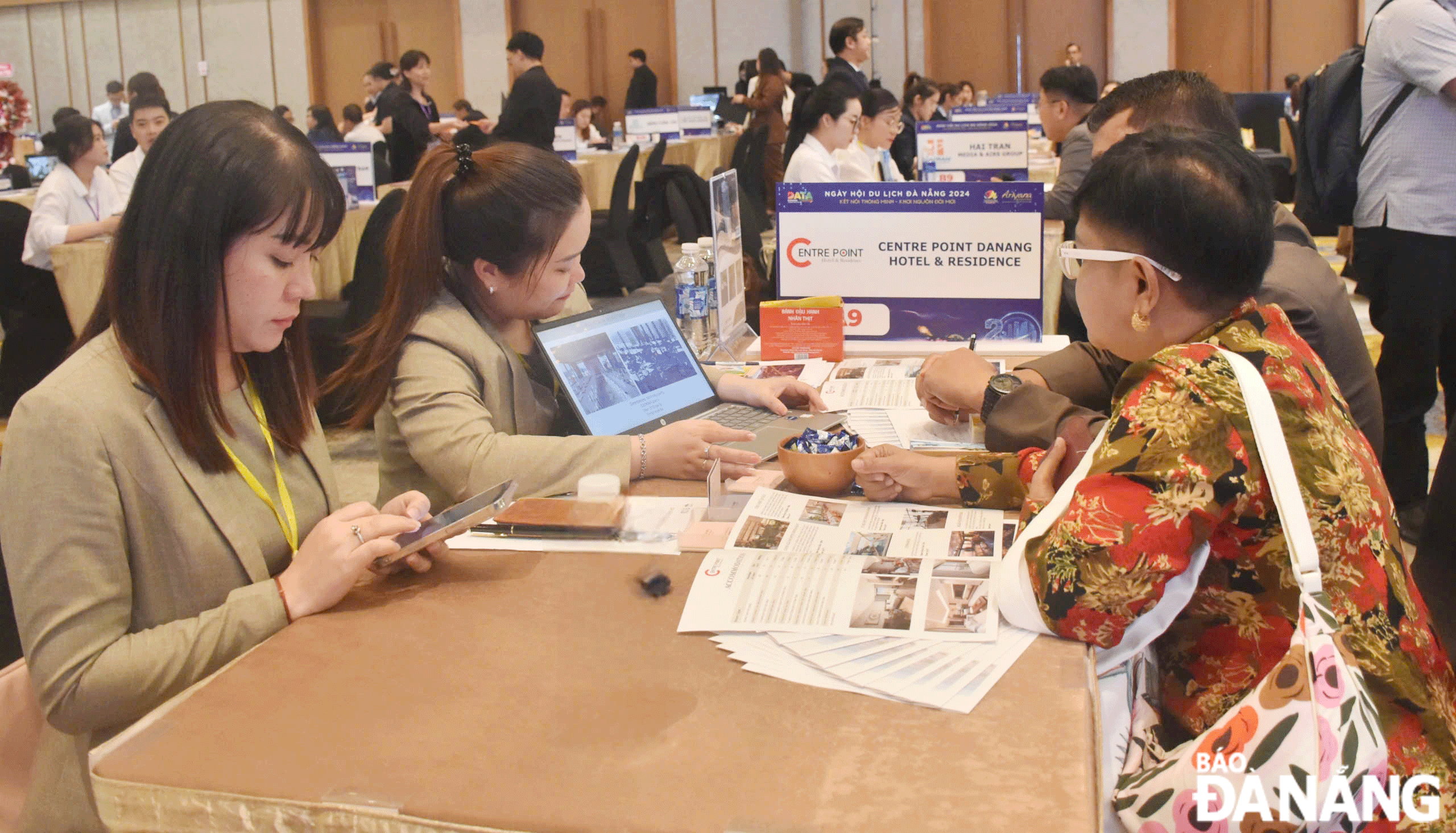Effectiveness of digital transformation in Da Nang tourism promotion
Tourism industry is undergoing a period of strong innovation thanks to the remarkable progress of technology. The application of advanced technologies in management and operation activities has helped tourism businesses quickly approach potential partners, bringing convenient and attractive travel experiences to tourists as well as making tourism promotion activities more effective.
 |
| Travel agencies and tourism service providers are boosting digital transformation to bring more convenience to tourists. IN PHOTO: Businesses met and connected at the recent Da Nang Tourism Festival 2024. Photo: THU HA |
Present in Da Nang not long ago, Wink Hotel is one of the hotels offering hi-tech applied services, providing more convenience for tourists.
Wink Hotel's Business Director Matt Kim said that Wink Hotel was one of the hotels that exploit the strengths of technology and service quality with the aim to bring new experiences to tourists. Wink Hotel has used many tech apps to support guests, including self-check-in service. Accordingly, visitors can check-in by themselves through the application installed on their personal mobile phones or through the check-in device at the hotel lobby and they can check in at any time of the day.
However, in reality, the number of hotels in the city applying digital transformation technology in a systematic and professional manner like Wink Hotel is not much. Tourism businesses and service providers are only at the initial steps because digital transformation and technology application require many factors such as investment costs and human resources.
Mr. Phung Quang Thang, Permanent Vice President of the Viet Nam Tourism Association, pointed out a number of key “bottlenecks” that need to be removed to boost digital transformation among tourism firms. Included were the lack of consensus and smart connection.
According to Mr. Thang, many businesses are still hesitant to invest in digital transformation activities because of the high risk, not to mention that businesses that want to apply digital transformation technology must have a suitable strategy.
He also highlighted the importance of human factor during the digital transformation process because there are too many applications and data in the digital space, forcing businesses to know how to operate properly.
The city's tourism industry has made great efforts in carrying out digital transformation activities, especially in communication and destination promotion. The focus has been on developing social networking platforms with large visits that are suitable for the trends and tastes of tourists in each market, such as Danang Tourism Information Portal (DanangfantastiCity) connected with the Danang Fantasticity and Naver fanpages, Naver Blog (South Korea); Douyin and Xiaohongshu channels (China); and Instagram (India).
Additionally, the industry has quickly approached digital transformation trends to boost communication and destination promotion by integrating a digital culinary map into the Da Nang tourism map; upgrading the interface of the Da Nang Tourism Information Portal; deploying VR360 virtual reality technology phase 3 and developing the VRmall feature; and building a 1:1 Metaverse Space multidimensional space consulting portal.
As of September 2024, the total number of VR360 virtual reality visits at https://vr360.danangfantasticity.com/ reached about 1.5 million.
Deputy Director of the Da Nang Department of Tourism Tan Van Vuong said that the implementation of digital transformation in the tourism industry has initially achieved certain results.
For example, the department has built and submitted to the municipal People's Committee to issue the Tourism Information Technology Application Architecture Framework. This framework is considered the foundation for developing a digital tourism ecosystem and a technical orientation for developing applications, allowing integration, sharing and connection with systems in smart cities.
Moreover, the department has basically completed the tourism industry database, issuing a list of tourism industry data specifications, effectively using software systems such as document management and operation, software for reviewing and synthesizing work, and online tourism business results reporting system.
As a result, six open data sets have been built (data on travel businesses, accommodation establishments, tourist attractions and tour guides) that have been integrated into the city's open data portal.
The Department has applied artificial intelligence (AI) technology to pilot the construction of a tourism monitoring system using surveillance cameras at the Da Nang Museum, the Linh Ung Pagoda and the Marble Mountains.
Tourism communication trends in 2025 will focus on social networks and applying ChatGPT technology to search for destination information, Metaverse and virtual reality (VR), and augmented reality (AR) for a more realistic experience in promoting destinations.
Therefore, the city's tourism industry will concentrate on building a tourism industry database, enhancing the experience of tourists, supporting businesses in digital transformation, putting the Digital Tourism Map into operation, and providing virtual reality tourism and online payment services to promote the image of local destinations.
Heed also will be on assisting businesses with introducing products and services in a bid to create added value for tourism products and services as well as improve operational efficiency and competitiveness.
Reporting by THU HA - Translating by M.DUNG